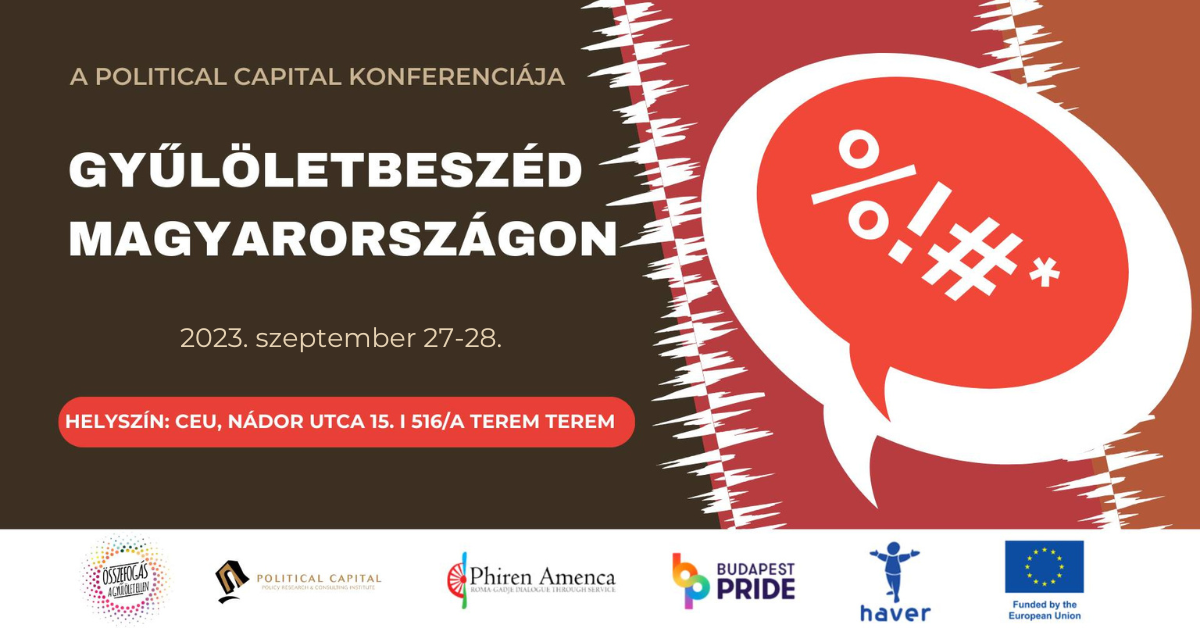(Görgess le a magyar nyelvű összefoglalóhoz)
Political Capital organised a two-day conference on “Hate Speech in Hungary” on 27-28 September 2023. The public day of the conference consisted of four round-table discussions, each focusing on a different aspect of the issue of hate speech, highlighting dilemmas, issues, gaps and good practices in the field. In the course of the discussions, we explored the issue of hate speech:
- regulation of hate speech,
- recognition and monitoring of hate speech,
- its impact on communities and society, and
- its relationship with artificial intelligence.
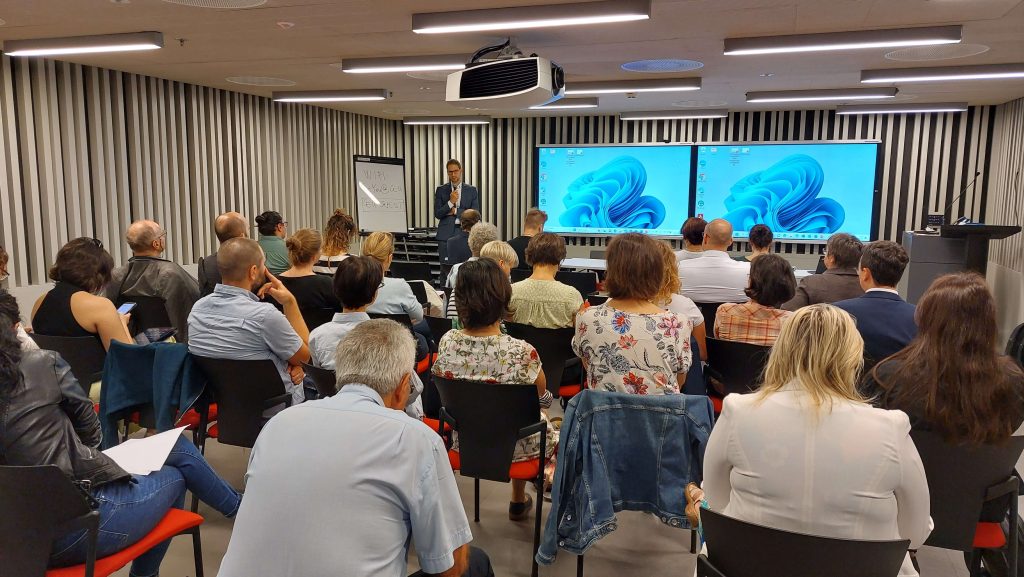
The first discussion of the conference focused on regulatory and enforcement issues related to hate speech.
Participants:
- Zsuzsanna Kunos – Associate, Political Liberties Project, Hungarian civil Liberties Union
- Erika Muhi – Lawyer, former Director of the National and Ethnic Minority Human Rights Organisation
- Gábor Polyák– Founder, Mérték Media Monitor; Senior Research Fellow, Center for Social Sciences, Institute for Legal Studies, Head of Department, ELTE BTK.
- Erzsébet Szalayné Sándor – Deputy Commissioner for National Minorities, Professor, PTE/UBB/UVT, Member of AC FCNM, Council of Europe
- Moderator: Veronika Szontagh, Analyst, Political Capital
The discussion touched upon the current legislation, enforcement practice, the problems and shortcomings that arise in this context.
Although hate speech legislation in Hungary covers a wide range of areas, it is inadequate to the current socio-political context and therefore ineffective. An appropriate legal environment is needed to curb hate speech, but the law alone is not sufficient at present – it cannot solve the systemic problem of hate speech through individual cases. In Hungary today, there is no moral environment that would prevent hate speech in society. In many cases, hate speech against minorities is directed by the government, and in some cases the law enforcement authorities interpret cases according to the current political course.
A fundamental problem is that it is difficult to define hate speech in legal terms. It is governed by three areas of law: civil law, criminal law and media law, all of which define the concept differently and none of which can tackle the phenomenon effectively.
The problem in the application of the law is that there are few cases, so few practical examples are available to practitioners. In addition, there are legal categories, in particular incitement to hatred, which, in the absence of a specific case, are not understood and are therefore difficult for law enforcement to interpret. The lack of protocols also means that public institutions are unable to deal with cases that arise within their jurisdiction.
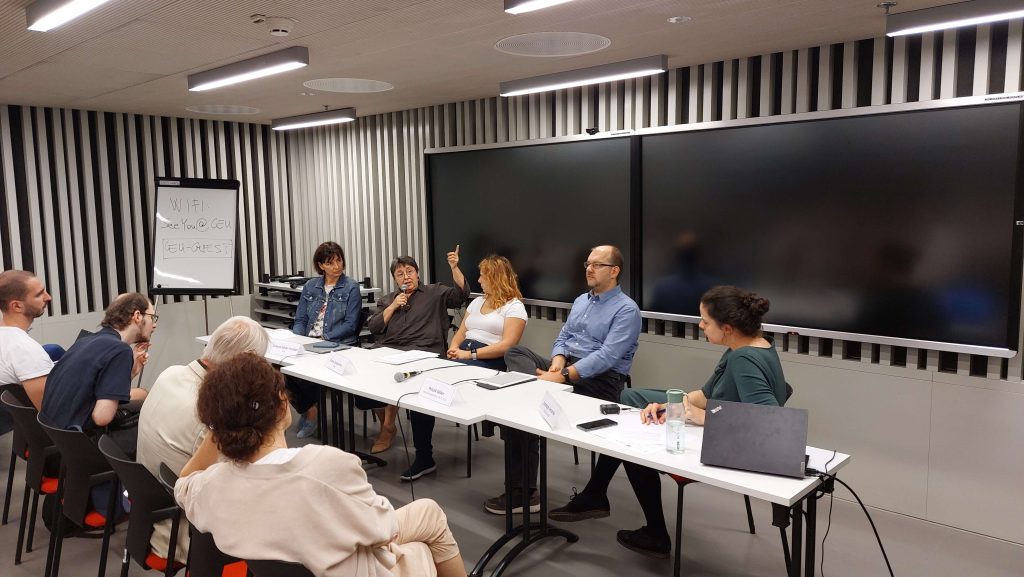
The second discussion was on the theme of recognising and monitoring hate speech.
Participants:
- Ildikó Barna– Associate Professor, ELTE Faculty of Social Sciences
- Róbert Buzsáki – Associate, Legal Programme, Háttér Society
- Anna Daróczi– Project Coordinator, Phiren Amenca
- Sára Ránki – Criminal Linguist, Criminal Analysis and Evaluation Department, National Police Headquarters
- Moderator: Bulcsú Hunyadi, Head of Programmes, Political Capital
The discussion covered the challenges and problematic areas of hate speech monitoring, different methodologies, machine monitoring issues and the role of social platforms.
Monitoring hate speech is important for a comprehensive understanding of the extent, content and form of hate speech.
There is no uniform methodology for monitoring hate speech in Hungary – the methodology used depends primarily on the purpose of the monitoring – which makes it difficult to compare results.
Both machine and human monitoring are present. Although human monitoring is often better at detecting hate speech content, experience shows that without machine monitoring, quantitative capacity is severely limited, and so the two need to be used in parallel.
Defining hate speech is problematic: it is not always clear what constitutes hate speech. In addition, there is a general difficulty with the lack of available data and the resources to obtain it.
It is a challenge for machine monitoring in particular, but also for human monitoring, to interpret sentences in context, to understand multimedia content, to deal with coded speech, sarcasm and humour. The communicator’s intention and the effect on the recipient may sometimes differ. Linguistics considers people to be essentially conscious language users, so that the communicator’s choice of communicative features and content can result in a text being considered hate speech even if it is not intended to be. In addition, every statement is part of a discourse, so its analysis is necessary to understand the content.
Hate speech often fails to be reported on social media platforms. This is partly because platforms do not delegate sufficient resources to do so, and partly because moderation is often carried out by AI tools that are not always able to decode hate content.
Hate speech monitoring can be effectively implemented through an interdisciplinary approach, involving NGOs, data analysts, linguists, lawyers and social scientists, among others.
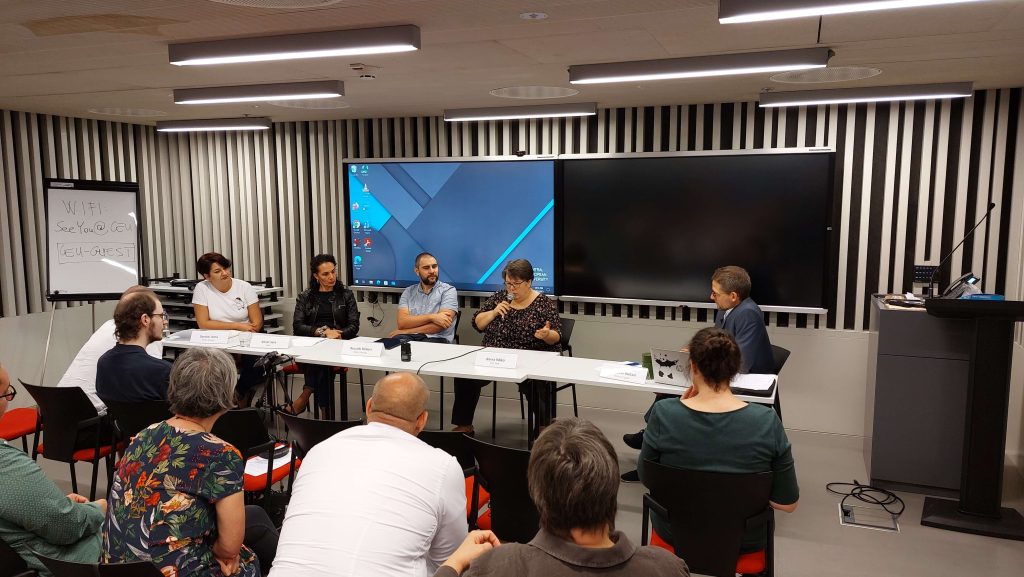
The third discussion focused on the impact of hate speech on communities and society.
Participants:
- Anikó Félix – Executive Director, Haver Foundation
- Herfort Marietta – Director, Phiren Amenca
- Nóra Lantos – social psychologist, adjunct professor, ELTE Department of Education and Psychology
- Viktória Radványi – President, Budapest Pride
- Moderator: Zsuzsa Kelen, analyst, Political Capital
During the discussion, the speakers sought to better understand the motivations of the perpetrators and to explore the impact of hate speech at the individual, community and societal levels, with a particular focus on the social groups targeted. The discussion also looked at what can be done to reduce the harmful effects and support victims of hate speech.
Hate speech has a strong negative impact not only on the social groups and communities it targets, but on society as a whole. Hate speech has a significant presence online and offline, and at almost all levels of society, which makes it unavoidable to encounter it, not only for the members of the group concerned.
When hate speech against a minority group is strong and widespread in a society, it can easily become the norm, leading to, among other things, distancing from that minority group, reinforcing prejudice and increasing hatred from the majority society.
Hate speech also destroys the targeted community: in addition to the fact that members of these communities have a difficult trajectory in society, they tend to hide and deny their identity, and the group’s self-definition is easily shaped in the face of hate speech.
It is important that, as well as standing up for themselves, all actors in society actively take action to fight hate speech. It is also essential to create a support infrastructure for those affected – if the state does not provide it, then it will be up to the citizens to do so.
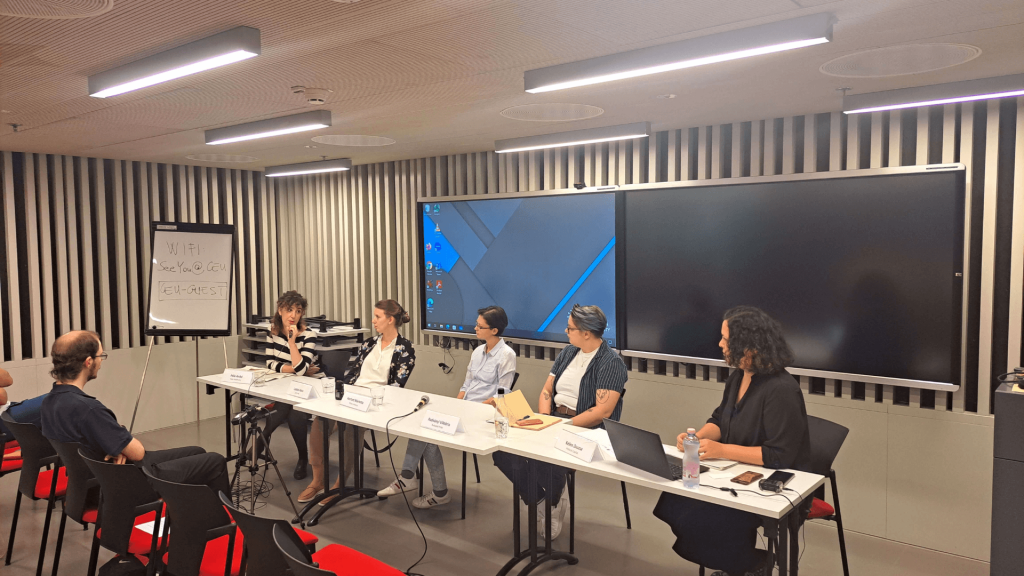
The fourth round table discussion focused on artificial intelligence and hate speech.
Participants:
- Kitti Mezei – Research Associate, Center for Social Sciences, Artificial Intelligence National Laboratory
- Melinda Pintér– Researcher, Institute for Social Reflection
- Sorbán Kinga – Research Associate, Ludovika University of Public Service, Institute for Information Society
- Moderator: Rudolf Berkes, analyst, Political Capital
The discussion covered the use of artificial intelligence in the fight against hate speech, its advantages, disadvantages, strengths and difficulties, as well as the regulation of online spaces.
Artificial intelligence can be effective in moderating and monitoring hate speech, but because its knowledge is based on human-generated texts, it can be biased.
Hate speech is an abstract concept with no commonly agreed definition, making it almost impossible to translate into machine language.
Regulation of the digital space is problematic. Although the EU regulates the content that is displayed, it leaves a lot of room for Member States to regulate their own content – which in many cases does not exist. Thus, the moderation of hate speech online depends mostly on the self-regulation of big tech companies, which comes from avoiding fines on the one hand, and PR activities that portray companies as ethical on the other. But they cannot solve the problem of hate speech, so they cannot be left to regulate it themselves.
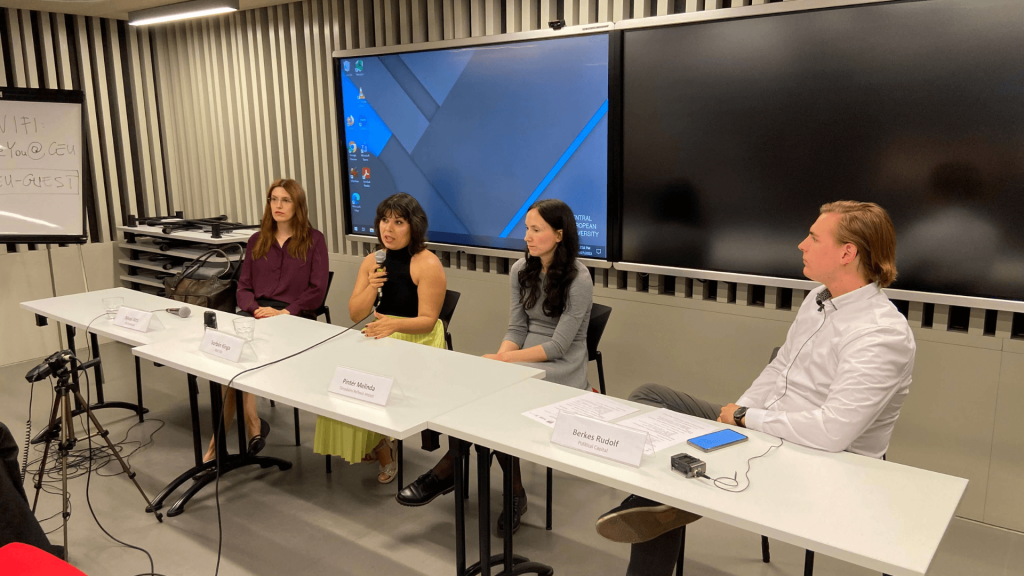
The main message of the conference was that hate speech is a very complex problem, which, as well as being present at multiple levels, has an impact at multiple levels. Thus, to solve it, actors in society need to act at multiple levels, both independently and in cooperation.
The First University Radio of Pest made an audio recording of the conference, which we would like to thank them for! The audio files:
“Hate speech in Hungary”, welcome and introductory speech
Round table discussion: regulatory and enforcement issues
Round table discussion: Recognition and monitoring of hate speech
Round table: The impact of hate speech at community and societal level
Round table discussion: Artificial intelligence and hate speech
Closing of the conference “Hate Speech in Hungary”
On the 28th of September, a closed workshop was organized for the participants and speakers of the previous day’s conference to explore future directions and formulate recommendations for stakeholders to effectively prevent and tackle online hate speech.
During the first session, the summary and results of the conference were summarized by Veronika Szontagh and the participants were asked to discuss their takeaways in small groups which were then presented in plenary.
The second session was dedicated to formulating recommendations in small groups: one group consisted of members of civil society organisations and gathered ideas for CSOs- what can and what should they do in order to successfully tackle online hate speech. The second group, with mostly lawyers, focused on the decision-makers’ and the law enforcement authorities’ duties; and the third one compiled suggestions for the media. Once all the groups created a list of recommendations in 45 minutes, the groups rotated two times and commented the lists of the other groups. The final session was dedicated to summarizing and discussing the three lists of recommendations. These suggestions serve as the basis of the recommendations to be developed by Political Capital in a later phase of the project.
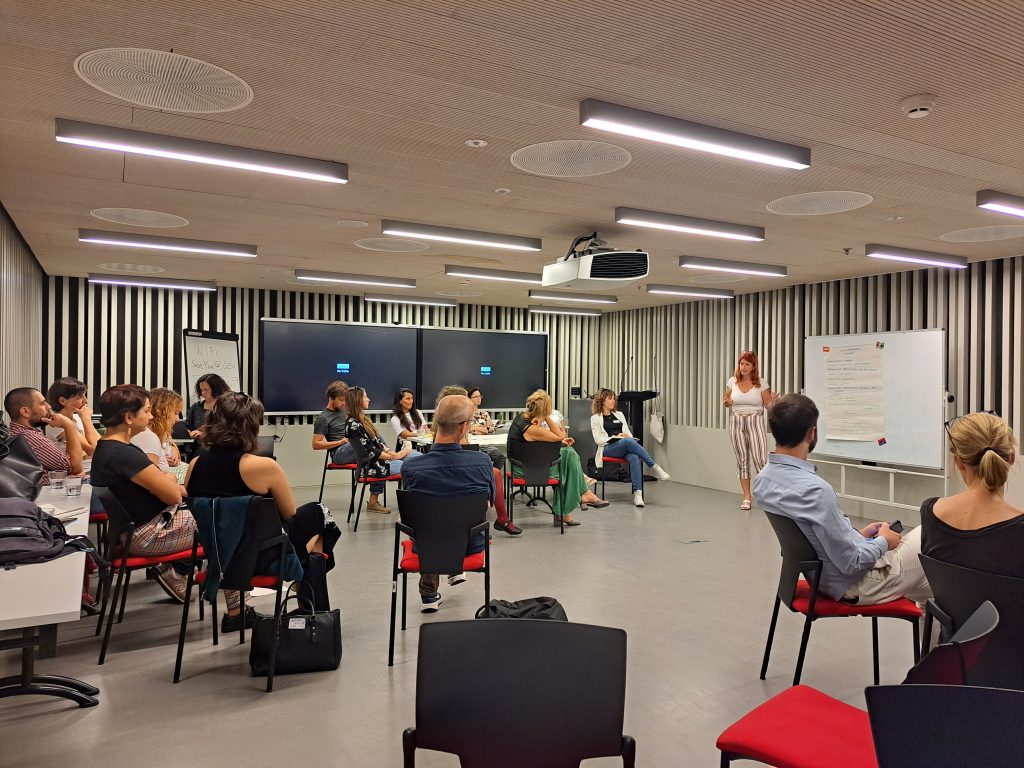
Gyűlöletbeszéd Magyarországon” – konferencia-beszámoló
A Political Capital 2023. szeptember 27-28-án konferenciát rendezett „Gyűlöletbeszéd Magyarországon” címmel. A konferencia a kozonség számára is nyitott napja négy kerekasztal-beszélgetésből állt, amelyek a gyűlöletbeszéd kérdésének egy-egy aspektusával foglalkoztak, rávilágítva az adott témában megjelenő dilemmákra, kérdésekre, hiányosságokra és jó gyakorlatokra. A beszélgetések során elismert szakértőkkel jártuk körbe a gyűlöletbeszéd
- jogi szabályozását,
- felismerésének és monitorozásának kérdéseit,
- közösségi és társadalmi hatásait, valamint
- kapcsolatát a mesterséges intelligenciával.
A konferencia első beszélgetése a gyűlöletbeszédhez kapcsolódó szabályozási és jogalkalmazási kérdésekről szólt.
Résztvevők:
- Kunos Zsuzsanna – munkatárs, Politikai Szabadságjogi Projekt, TASZ
- Muhi Erika– ügyvéd, a Nemzeti és Etnikai Kisebbségi Jogvédő Iroda volt igazgatója
- Polyák Gábor– alapító, Mérték Médiaelemző Műhely; tudományos főmunkatárs, TK Jogtudományi Intézet, tanszékvezető, ELTE BTK
- Szalayné Sándor Erzsébet– nemzetiségi biztoshelyettes, AJBH, egyetemi tanár, PTE/UBB/UVT, az AC FCNM tagja, Európa Tanács
- Moderátor: Szontagh Veronika, elemző, Political Capital
A beszélgetés érintette a jelenlegi szabályozást, a jogalkalmazási gyakorlatot, illetve azt, hogy milyen problémák, hiányosságok merülnek fel ezekkel kapcsolatban.
- Bár Magyarországon a gyűlöletbeszéd szabályozása számos területre kiterjed, nem adekvát a jelen társadalmi-politikai körülményekre, ezért nem is hatékony. A gyűlöletbeszéd visszaszorításához szükség van a megfelelő jogi környezetre, de önmagában a jog eszközei jelenleg nem elegendőek – egyedi esetekkel nem tudja megoldani a gyűlöletbeszéd rendszerszintű problémáját. Magyarországon ma nincs meg az a morális környezet, ami a gyűlöletbeszédnek gátat szabna a társadalomban. A kisebbségekkel szembeni gyűlöletbeszéd sok esetben a kormány által irányított, a jogalkalmazók az ügyeket pedig bizonyos esetekben a jelen politikai kurzusnak megfelelően értelmezik.
- Alapvető probléma, hogy jogilag nehéz definiálni a gyűlöletbeszéd fogalmát. Három jogterület szabályozza: a polgári jog, a büntetőjog és a médiajog, amelyek mind máshogy határozzák meg a fogalmat, és valójában egyik sem tud hatékonyan fellépni a jelenséggel szemben.
- A jogalkalmazásban problémát jelent, hogy kevés eset jelenik meg, így kevés gyakorlati példa áll a jogalkalmazók előtt. Emellett van olyan jogi kategória, elsősorban a gyűlöletre uszítás fogalma, amely megjelenő eset híján nem ismert, és így nehezen értelmezhető a jogalkalmazók számára. A hiányos protokollok miatt az állami intézmények sem képesek kezelni a hatáskörükben megjelenő eseteket.
A második kerekasztal témája a gyűlöletbeszéd felismerése és monitorozása volt.
Résztvevők:
- Barna Ildikó– tanszékvezető egyetemi docens, ELTE TáTK
- Buzsáki Róbert – munkatárs, Jogi Program, Háttér Társaság
- Daróczi Anna– projektkoordinátor, Phiren Amenca
- Ránki Sára – bűnügyi nyelvész, Bűnügyi Elemző és Értékelő Főosztály, ORFK
- Moderátor: Hunyadi Bulcsú, szakmai vezető, Political Capital
A beszélgetés során szó esett a gyűlöletbeszéd monitorozásának kihívásairól, problémás területeiről, különböző módszertanokról, a gépi monitorozás kérdéseiről, valamint a közösségi platformok szerepéről.
- A gyűlöletbeszéd monitorozása fontos a gyűlöletbeszéd mértékének, tartalmának, formájának átfogó megismeréséhez.
- Magyarországon nincs egységes módszertan a gyűlöletbeszéd monitorozására – az alkalmazott módszertan elsősorban a monitorozás céljától függ –, ami megnehezíti az eredmények összehasonlítását.
- Egyaránt jelen van a gépi és az emberi monitorozás. Bár az emberi monitorozás sokszor jobban felismeri a gyűlöletkeltő tartalmakat, a tapasztalatok alapján a gépi monitorozás nélkül a mennyiségi kapacitás erősen korlátozott, így a kettő párhuzamos alkalmazására van szükség.
- Problémás a gyűlöletbeszéd meghatározása: nem minden esetben egyértelmű, mi minősül annak. Emellett általános nehézséget jelent az elérhető adatok és az ennek megszerzéséhez szükséges erőforrások hiánya.
- Elsősorban a gépi, de még a humán monitorozás számára is kihívást jelent kontextusában értelmezni az elhangzott mondatokat, megérteni a multimédiás tartalmakat, helyén kezelni a kódolt beszédet, a szarkazmust, a humort. A közlői szándék és a befogadóra gyakorolt hatás olykor eltérhet, de a nyelvészet az embereket alapvetően tudatos nyelvhasználónak tekinti, így a közlő által megválasztott kommunikációs jellemzők és tartalom következtében a szöveg akkor is tekinthető gyűlöletbeszédnek, ha nem annak szánta. Ezek mellett minden kijelentés valamilyen diskurzus részeként jelenik meg, így annak vizsgálata is szükséges a tartalom megértéséhez
- A gyűlöletbeszéd jelentése a közösségimédia-platformokon sokszor sikertelen. Egyrészt azért, mert a platformok nem delegálnak erre elegendő erőforrást, másrészt azért, mert a moderálást sokszor AI-eszköz végzi, ami nem minden esetben képes dekódolni a gyűlöletkeltő tartalmat.
- A gyűlöletbeszéd monitorozását interdiszciplináris megközelítéssel lehet hatékonyan megvalósítani, többek között civil szervezetek, adatelemzők, nyelvészek, jogászok, társadalomtudósok bevonásával.
A harmadik beszélgetés a gyűlöletbeszéd közösségi és társadalmi hatásainak kérdéseit járta körül.
Résztvevők:
- Félix Anikó – ügyvezető igazgató, Haver Alapítvány
- Herfort Marietta –igazgató, Phiren Amenca
- Lantos Nóra – szociálpszichológus, egyetemi adjunktus, ELTE PPK
- Radványi Viktória – elnök, Budapest Pride
- Moderátor: Kelen Zsuzsa, elemző, Political Capital
A beszélgetés során a megszólalók egyrészt törekedtek az elkövetői oldal motivációinak jobb megértésére, másrészt a gyűlöletbeszéd egyéni, közösségi és társadalmi szintű hatásainak feltérképezésére, kiemelt figyelemmel a célpontját képező társadalmi csoportokra. A beszélgetés résztvevői emellett arra is kitértek, hogy mit lehet tenni a káros hatások csökkentéséért és a gyűlöletbeszéd áldozatainak támogatásáért.
- A gyűlöletbeszéd nemcsak azokra a társadalmi csoportokra, közösségekre van erős negatív hatással, akik felé irányul, hanem a teljes társadalomra. A gyűlöletbeszéd jelentős mértékben jelen van online és offline, valamint a társadalom szinte minden szintjén, ami kikerülhetetlenné teszi az ezzel való találkozást, nem csak az érintett csoport tagjai számára.
- Ha egy társadalomban erősen és nagy mértékben megjelenik egy kisebbségi csoporttal szembeni gyűlöletbeszéd, az könnyen normává válhat, ami többek között az adott kisebbségi csoporttal szembeni távolságtartáshoz, az előítéletek erősödéséhez és fokozott gyűlölködéshez vezet a többségi társadalom részéről.
- A gyűlöletbeszéd a célpontjába kerülő közösséget is rombolja: amellett, hogy ezen közösségek tagjai a társadalomban nehezített pályán mozognak, tagjai hajlamosak elrejteni és megtagadni identitásukat, a csoport önmeghatározása is könnyen a gyűlöletbeszéddel szemben formálódik meg.
- Fontos, hogy amellett, hogy az érintett csoportok kiállnak magukért, a társadalom minden szereplője aktívan tegyen értük és a gyűlöletbeszéd ellen. Emellett feltétlenül szükséges egy támogató-segítő infrastruktúra létrehozása az érintettek számára – ha az állam ezt nem teremti meg, akkor civil kezdeményezésre.
A negyedik kerekasztal-beszélgetés a mesterséges intelligencia és a gyűlöletbeszéd témáját járta körül.
Résztvevők:
- Mezei Kitti –tudományos munkatárs, TK JTI/MILAB
- Pintér Melinda– kutató, Társadalmi Reflexió Intézet
- Sorbán Kinga –tudományos segédmunkatárs, NKE ITKI
- Moderátor: Berkes Rudolf, elemző, Political Capital
A beszélgetés során szó volt a mesterséges intelligencia használatáról a gyűlöletbeszéd elleni küzdelemben, ennek előnyeiről, hátrányairól, erősségeiről és nehézségeiről, valamint szó esett az online tér szabályozásáról is.
- A mesterséges intelligencia egyrészt hatékony lehet a gyűlöletbeszéd moderálásában és monitorozásában, másrészt, mivel emberek által alkotott szövegeken alapul a tudása, nehezen lehet elfogulatlan.
- A gyűlöletbeszéd absztrakt fogalom, amelynek definíciójában nincs konszenzus, így ezt gépi nyelvre lefordítani szinte lehetetlen.
- Problémás a digitális tér szabályozása. Az EU bár szabályozza a megjelenő tartalmat, nagy teret enged ebben a tagállamok saját szabályozásainak – ami sok esetben nem is létezik. Így a gyűlöletbeszéd online moderálása leginkább a nagy techcégek önszabályozásán múlik, ami egyrészt a pénzbüntetések elkerüléséből, másrészt a cégeket etikusként feltüntető PR tevékenységekből jön létre. A gyűlöletbeszéd problémáját megoldani viszont nem tudják, így a szabályozást sem lehet rájuk hagyni.
A konferencia fő tanulsága, hogy a gyűlöletbeszéd nagyon komplex probléma, ami amellett, hogy több szinten jelenik meg, hatását is több szinten fejti ki. Így megoldásához is a társadalom szereplőinek több szinten, egymástól függetlenül is, illetve együttműködésben is cselekedniük szükséges.
A konferenciáról az Első Pesti Egyetemi Rádió hangfelvételt készített, amit ezúton is nagyon köszönünk nekik! A hanganyagok:
- „Gyűlöletbeszéd Magyarországon”, köszöntő és bevezető előadás
- Kerekasztal-beszélgetés: Szabályozási és jogalkalmazási kérdések
- Kerekasztal-beszélgetés: A gyűlöletbeszéd felismerése és monitorozása
- Kerekasztal-beszélgetés: A gyűlöletbeszéd hatásai közösségi és társadalmi szinten
- Kerekasztal-beszélgetés: Mesterséges intelligencia és gyűlöletbeszéd
- „Gyűlöletbeszéd Magyarországon” konferencia zárása
Szeptember 28-án az előző napi konferencia résztvevői és előadói számára zárt műhelytalálkozót szerveztünk, hogy feltárjuk a jövőbeli irányokat, és ajánlásokat fogalmazzunk meg az érdekelt felek számára az online gyűlöletbeszéd hatékony megelőzése és kezelése érdekében.
Az első szekcióban Szontagh Veronika foglalta össze a konferencia beszélgetéseit és eredményeit, majd a résztvevők kis csoportokban megvitatták a tanulságokat, amelyeket aztán plenáris ülésen ismertettek.
A második részben a résztvevők kiscsoportokban fogalmaztak meg ajánlásokat: az egyik csoport a civil szervezetek tagjaiból állt, és a civil szervezetek számára gyűjtöttek ötleteket – mit tehetnek és mit kellene tenniük az online gyűlöletbeszéd sikeres kezelése érdekében. A második csoport, amelyben főként jogászok vettek részt, a jogalkotók és a jogalkalmazók feladataival foglalkozott; a harmadik csoport pedig a média számára állított össze javaslatokat. Miután minden csoport 45 perc alatt összeállította az ajánlások listáját, a csoportok kétszer váltották egymást, és kommentálták a többi csoport listáját.
Az utolsó műhely során a három lista összegzésére és megvitatására került sor. Ezek a javaslatok a Political Capital által a projekt egy későbbi szakaszában kidolgozandó ajánlások alapjául szolgálnak majd.
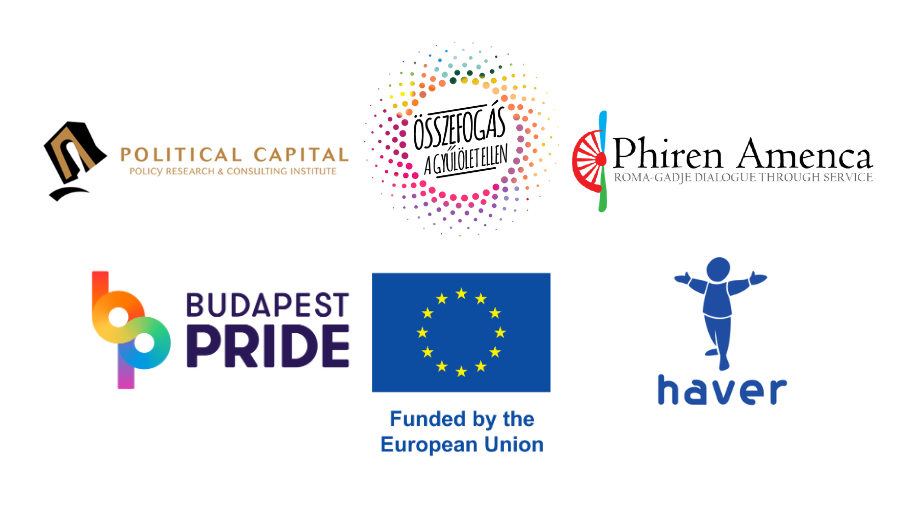
The „CHAD – Countering Hate Speech and Hurtful Speech against Diversity: Roma, LGBTIQ, Jewish and Migrant Communities” project (project nr. 101049309) is funded by the Citizens, Equality, Rights and Values Programme (CERV) of the DG Justice, European Commission and coordinated by RGDTS Nonprofit Llc. in partnership with Haver Informal Educational Foundation, Rainbow Mission Foundation and Political Capital. Views and opinions expressed are however those of the author(s) only and do not necessarily reflect those of the European Union or the European Commission. Neither the European Union nor the granting authority can be held responsible for them.


